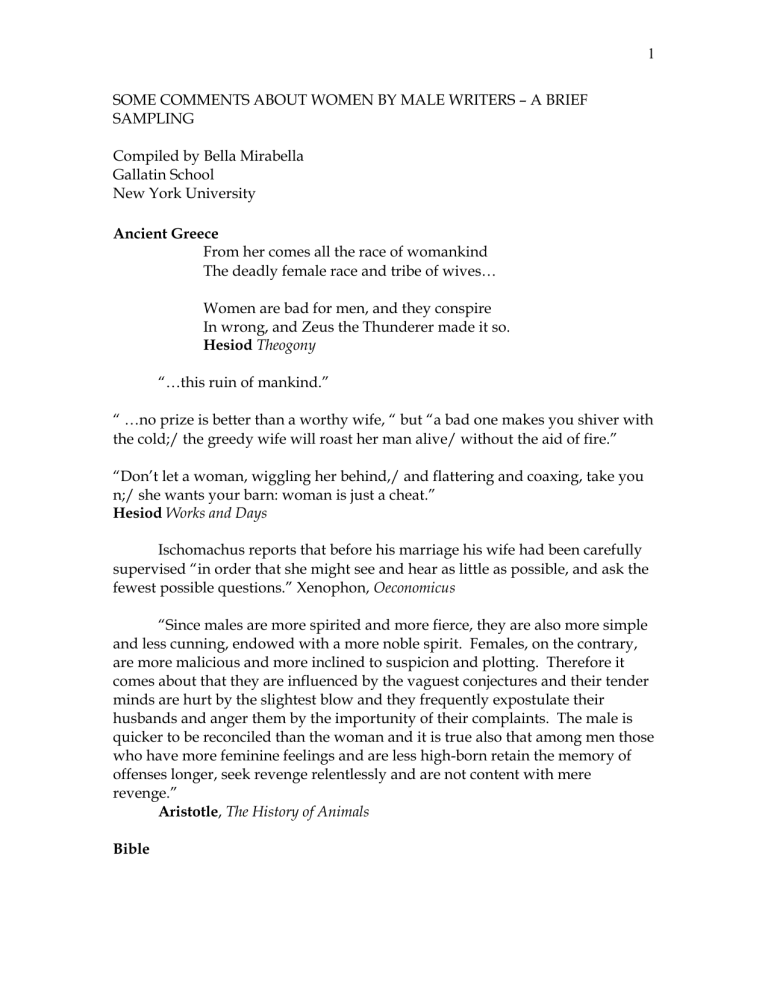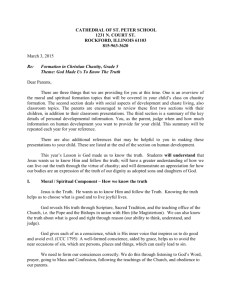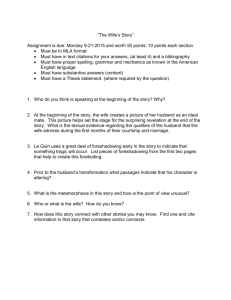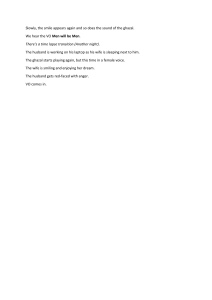
1 SOME COMMENTS ABOUT WOMEN BY MALE WRITERS – A BRIEF SAMPLING Compiled by Bella Mirabella Gallatin School New York University Ancient Greece From her comes all the race of womankind The deadly female race and tribe of wives… Women are bad for men, and they conspire In wrong, and Zeus the Thunderer made it so. Hesiod Theogony “…this ruin of mankind.” “ …no prize is better than a worthy wife, “ but “a bad one makes you shiver with the cold;/ the greedy wife will roast her man alive/ without the aid of fire.” “Don’t let a woman, wiggling her behind,/ and flattering and coaxing, take you n;/ she wants your barn: woman is just a cheat.” Hesiod Works and Days Ischomachus reports that before his marriage his wife had been carefully supervised “in order that she might see and hear as little as possible, and ask the fewest possible questions.” Xenophon, Oeconomicus “Since males are more spirited and more fierce, they are also more simple and less cunning, endowed with a more noble spirit. Females, on the contrary, are more malicious and more inclined to suspicion and plotting. Therefore it comes about that they are influenced by the vaguest conjectures and their tender minds are hurt by the slightest blow and they frequently expostulate their husbands and anger them by the importunity of their complaints. The male is quicker to be reconciled than the woman and it is true also that among men those who have more feminine feelings and are less high-born retain the memory of offenses longer, seek revenge relentlessly and are not content with mere revenge.” Aristotle, The History of Animals Bible 2 “Let your wives be silent in church, for it is not permitted them to speak, but to be subject, as the law commands. If they wish to learn anything, let them ask their husbands at home.” St Paul. 1 Timothy 2: 11-12 “Let a woman learn in silence with all subjection. I do not permit a woman to teach or to have authority over her husband, but to remain silent.”** “Let the marriage between you be honorable and the marriage bed unspotted.” St Paul. Hebrews 13:4 “A woman does not have power over her own body but the husband does.” St. Paul. 1 Corinthians 7:4 “The head of man is Christ; the head of woman is man.” St Paul (5-67 CE). 1 Corinthians 11:3 Ancient Rome, Early Christianity “The sentence of God on this sex of yours lives in this age: the guilt must of necessity live too. You are the devil’s gateway. You are the eater of that forbidden tree. You are the first deserter of the divine law. You are she who persuaded him whom the Devil was not valiant enough to attack. You destroyed so easily God’s image, man. On account of your desertion, there is death; even the Son of God had to die.” Tertullian, 200 CE "It would indeed be a difficult matter to find anything which is productive of more marvelous effects than the menstrual discharge. On the approach of a woman in this state, must will become sour, seeds which are touched by her become sterile, grafts wither away, garden plants are parched up, and the fruit will fall from the tree beneath which she sits. Her very look, even, will dim the brightness of mirrors, blunt the edge of steel, and take away the polish from ivory. A swarm of bees, if looked upon by her, will die immediately; brass and iron will instantly become rusty, and emit an offensive odor; while dogs which may have tasted of the matter so discharged are seized with madness, and their bite is venomous and incurable." Pliny the Elder, The Natural History, 79 CE “Nothing is so unclean as a woman in her periods.” St Jerome (347-420, referring to Leviticus Medieval Period 3 “Indeed, if men were endowed, like the lynxes of Boetia, with the power of visual penetration and could see what there is beneath the skin, the mere sight of a woman would nauseate them: that feminine grace is only saburra, blood, humor, bile. Consider what is hidden in the nostrils, in the throat, in the belly: filth everywhere….How can we desire to hold in our arms the bag of excrement itself? Father Odon, Abbot of Cluny, 1100. “…woman is defective and misbegotten, for the active force in the male seed tends to the production of a perfect likeness in the masculine sex, while the production of woman comes from a defect in the active force or from some external change, such as that of a south winds, which is moist, as the Philosopher observes. On the other hand, in relation to the universal nature, woman is not misbegotten, but is included in nature’s intention as ordered to the work of generation.” Thomas Aquinas, Summa Theologica, 1265-74 Medieval/Renaissance “A woman is an imperfect creature excited by a thousand foul passions, abominable even to remember…No other creature is less clean than woman: the pig, even when he is most wallowed in mud, is not as foul as they. If perhaps someone would deny this, let him consider their childbearing; let him search the secret places where they in shame hide the horrible instruments they employ to take away their superfluous humors.” Boccaccio The Corbaccio, 1355 “And let it be clear to you that she who seems most chaste and virtuous in this cursed multitude would rather have one eye than be content with just one man.” The Corbaccio Women were “an embarrassment to man…a continual worry…a neverending trouble.” St. Bonaventure “Women are almost always timid by nature, soft, slow and, therefore, most useful when they sit still and watch over our things. It is as though Nature thus provided for our well-being, arranging for men to bring things home and for women to guard them. The woman as she remains locked up at home should watch over our things by saying at her post by diligent care and watchfulness.” Leon Battista Alberti (1404-72), Della Famiglia “It is up to the husband, who is wiser, to counsel and teach his wife that which she ought to know rather than for her to counsel her husband…In her soul, she is equal to her husband, but in the flesh, the husband is superior to the wife, who much obey him in all things that are permitted and honest.” St. Bernardino Perdiche Volgari, quoted in Alberti 4 “[She], who has won such praise for her eloquence, does things which little befit her erudition and reputation—although this saying of many wise men I hold to be true: that an eloquent woman is never chaste, and the behavior of many learned women also confirms this truth…” Anon attack on Isotta Nogarola “To her [a female] neither the intricacies of debate nor the oratorical artifices of action and delivery are of the least practical use, if indeed they are not positively unbecoming. Rhetoric in all its forms…lies absolutely outside the province of women.” Leonardo Bruni (outlining a course of study for the daughter of Battista Montelfeltro) “For if a woman throws her arms around while speaking, or if she increases the volume of her speech with greater forcefulness, she will appear threateningly insane and require restraint.” Bruni warns that “rhetoric in all its forms—public discussion, forensic argument, logical defense, and the like—lies absolutely outside the province of women.” Leonardo Bruni (1379-1444), De Studiis et litteris “Women should be used like chamber pots: hidden away once a man has pissed in them.” Marsilio Ficino 1433-1499 “A woman must not rashly follow her own judgment, lest with her slight initiation into learning and the study of letters she mistake false for true, harmful for salutary, foolish and senseless for serious and commendable.” Juan Luis Vives, The Education of a Christian Woman, 1524. “I think it is abundantly clear that chastity is, so to speak, the queen of female virtues.” “A woman should live in seclusion and not be known to many. It is a sign of imperfect chastity and of uncertain reputation…” “She should not desire to see or to be seen, or cast her glance this way and that….She will keep her eyes cast down, and will not raise them but rarely and with modesty and decorum. She will not stare at anyone intently or in an unbecoming manner.” 5 “They must not contaminate the chaste and holy marriage bed by sordid and lustful acts.” “Chastity must be greater in a married woman than in an unmarried one, for if you pollute and violate it now (God forbid!), see the harm you do to many and how many avengers you incite against you by one wicked deed.” “And do not mistake the fact, woman, that modesty and chastity have been entrusted to you, given into your custody, and commended to you by your husband.” “But especially to be avoided is that of laughter…I do not wish that a young woman be talkative…it is best to have as little contact with men as possible.” “Now the bridle must be put on the tongue, which is easily done if the mind is bridled….Therefore, though it may be very difficult, it is a beautiful and outstanding virtue in a woman to control the tongue.” “In setting man over woman, God also, as author and originator of all things, indicates that man is more worthy of honor.” “In marriage as in human nature, the man stands for the mind, the woman for the body. He must command, and she must serve, if man is to live.” “But if through his proclivity to vice or lack of control he beats you, consider that you are being corrected by God, and that this is happening to you because of some of your sins, which are expiated in that way.” All of the above quotations come from Vives. Examples of women speaking back-- the Other Voice “Suppose that the husband, of whatever class he may be, has extremely perverse and rude behavior. Suppose he is unloving….If the wife cannot remedy the situation, she must put up with all this and dissimulate wisely, pretending that she does not notice it….If you speak to him harshly you will gain nothing, and if he leads you a bad life you will be kicking against the spur; he will perhaps leave you, and people will mock you all the more and believe shame and dishonor, and it may be still worse for you. You must live and die with him whatever he is like.” Christine de Pizan, Treasure of the City of Ladies, France, 1405 “If men usurp our rights, should we not complain and declare that they have wronged us? For if we are their inferiors in status, but not in worth, this is an abuse that has been introduced into the world and that men have then, over time, gradually 6 translated into law and custom; and it has become so entrenched that they claim (and actually believe) that the status they have gained through their bullying is theirs by right. And we women, who, among our other good qualities, are eminently mild, peaceful…are prepared to put up even with an offence of this magnitude for the sake of a peaceful life. And we would suffer it still more willingly if they would just be reasonable and allow things to be equal and there to be some parity, if they did not insist on exerting such absolute control over us and in such an arrogant manner, treating us like slaves who cannot take a step without asking their permission or say a word without their jumping down our throats. Does this seem a matter of such little interest to us that we should be quiet and let things pass in silence?” Moderata Fonte, The Worth of Women, Venice, 1592. **There is some dispute about whether this can be attributed to St. Paul; many scholars feel that it is Timothy who said this. In the early modern period, it was attributed to St. Paul; since it is quoted this way in Vives, this is what the women and men of the Renaissance would have read.





